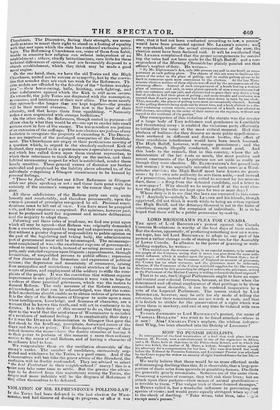VIOLATION OF MR. ELPHINSTONE'S POLL1NG-LAW.
IF the Tories had been defeated in the last election for West- Minster, and had discove ed dining its progress, or after it was
over, that it had not been conducted according, a penten
7.0 law, would have been presented against Mr. LEADRR'S return; ati41 we apprehend, under the actual circumstances of the cafe!, tire election must have been declared void. It will be recollected that Mr. LEADER complained that the proper arrangements for receiv2 ing the votes had not been made by the High Bailiff: and a cor- respondent of the Morning Chronicle has plainly pointed out that officer's neglect of duty. He writes—
fly Mr. Elphinstone's Act, only SOO persons can poll in one booth or coot-
partment at each polling-place. The objects of this act were to facilitate the access of the voter to tte place of polling, and to enable polling- pl lees to be
fixed in numerous spots most convenient to the electors. At the late West-
minster elect nit neither of these objects was effected by the arrangements of the returning officer. Instead of each vompartment of a booth having a dietinet place of entrance and exit, in some places upwards of nine compartments had only one entrance and one exit, and electors had to press their way down a long line of clerks to find their place of polling ; and more trouble and confusion was created than if each person's name bad been taken down in turn by one clerk. Then, secondly. the places of polling were most inconveniently situated. Instead of the polling districts being madeout by Street lists, ;mil a book allotted to a dis- trict containing certain streets, every compartment of a booth Was allotted to 300 electors, according to the order of their names on the register, without any regard to the residence of the parties."
One consequence of this violation of the statute was the muster of a large body of Tory noblemen and gentlemen in formidable and threatening array : it enabled the victorious party effectually to intimidate the voter at the most critical moment. Had this phalanx of bullies—for they deserve no more polite appellation— been scattered in different and distant booths, the effect of their scandalous interference would have been much lessened. The High Bailiff, however, will escape punishment ; and the
election, though illegally conducted, will stand good. And this leads to the remark, that in this country, where the ad- ministration of the law costs so much, the most positive anti recent enactments of the Legislature are set aside as coolly as though they were obsolete. Mr. ELPH Ns-iv:sues Act passed only last session ; it was especially intended for such cases as a West-
minster election ; the high Bailiff must have known its provi- sions : by his own sole authority he sets them aside,—and instead of a prosecution, instead of being called to account for his miscon-
duct, there is a fling from the defeated candidate, and a letter iii
a newspaper ! Why should we be surprised if at the next elec- tion the polling-booths are kept open for two or more das s ?
Whose duty is it to see that the laws are executed in this coun- try ? Anybody's—nobody's. Mr. LEADER and his friends, though aggrieved, did not think it worth while to bring an action against the High Bailiff, and the Attorney-General is not in the habit of interfering except on the complaint of individuals. It is to ha hoped that there will be a public prosecutor by-and-by.


























 Previous page
Previous page